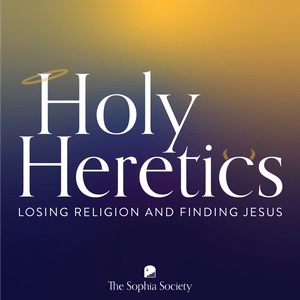Ep 89: We’re Done: Womanism in MAGA America w/Dr. Angela Parker
Episode Summary:You need to sit down for this episode.Mercer University’s Dr. Angela Parker joins me today on the podcast for a heart-wrenching conversation about white supremacy, intersectionality, womanist theology, authoritarian Christianity, decolonization, Kamala Harris, and her sought-after book, If God Still Breathes, Why Can’t I? According to Eerdmans Publishing House, “Angela Parker wasn’t just trained to be a biblical scholar; she was trained to be a White male biblical scholar. She is neither White nor male.” Thank God.Womanist theology is a methodological approach to theology that centers the experiences and perspectives of Black women, particularly African-American women. Emerging in the mid to late 1980s, it serves as a corrective to early feminist theology—which often overlooked racial issues—and Black theology, which predominantly reflected male viewpoints. In plain language, Womanist theology interprets the Bible, Christianity, and life here in the American empire through the eyes and lived experiences of Black women.As a Black scholar who traces her family history out of slavery, segregation, Jim Crow, and into the halls of higher education, Dr. Parker talks candidly about what it means to be an educated Black woman in both predominantly white higher education and Trump’s MAGA America.I know I say this a lot, but this is one of the most important conversations we’ve had to date on Holy Heretics.If the United States is to survive the MAGA cult, it will be through the embodied actions, wisdom, spirituality, and lived experience of Black women and men who understand what it takes to resist, regroup, and offer the world a beautiful invitation into God’s beloved, alternative community. In the context of Trump's America, characterized by racist policies and rhetoric, Womanist theology is particularly poignant. By offering a framework that not only addresses the intersections of race, gender, and class, “womanism” also actively resists the oppressive structures of White America.BIO:Rev. Dr. Angela N. Parker is associate professor of New Testament and Greek at McAfee School of Theology at Mercer University. She received her B.A. in religion and philosophy from Shaw University (2008), her M.T.S. from Duke Divinity School (2008-2010) and her Ph.D. in Bible, culture, and hermeneutics from Chicago Theological Seminary (2015). Before this position, Dr. Parker was assistant professor of Biblical Studies at The Seattle School of Theology & Psychology. She teaches courses in New Testament, Greek Exegesis, the Gospel of Mark, the Corinthians Correspondence, the Gospel of John, and Womanist and Feminist Hermeneutics unto preaching.In her research, Dr. Parker merges Womanist thought and postcolonial theory while reading biblical texts. Dr. Parker’s most popular book is titled, If God Still Breathes, Why Can’t I: Black Lives Matter and Biblical Authority. In this book, Dr. Parker draws from her experience as a Womanist New Testament scholar in order to deconstruct one of White Christianity’s most pernicious lies: the conflation of biblical authority with the doctrines of inerrancy and infallibility. As Dr. Parker shows, these doctrines are less about the text of the Bible itself and more about the arbiters of its interpretation—historically, White males in positions of power who have used Scripture to justify control over marginalized groups. This oppressive use of the Bible has been suffocating. To learn to breathe again, Dr. Parker says, we must “let God breathe in us.”Please Follow us on social media (use the buttons below) and help us get the word out! (Also, please don’t hesitate to use any of these channels or email to contact us with any questions, concerns, or feedback.)If you enjoyed this episode, please leave us a rating and a review, or share on your socials 🙏Show notes:http://www.sophiasociety.org/podcast/womanist-theology-in-maga-americaFollow us on social media! Twitter: @holyheretics | Instagram: @holyhereticspodcast | Facebook: @holyheretics | Substack: holyheretics.substack.comAdvertising inquiries:
[email protected] our work on Patreon or Substack and get early access to episodes and premium content like our online class on deconstruction!https://www.patreon.com/holyheretics or subscribe to our Substack to gain access to Holy Heretics Shorts, premium content, and our online class on faith deconstruction!This episode was produced by The Sophia Society and written by Gary Alan Taylor. Music is by Faith in Foxholes.

